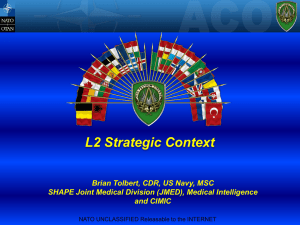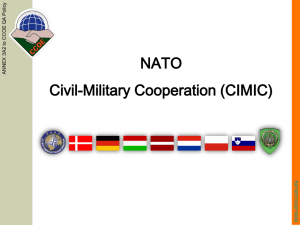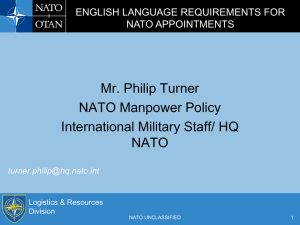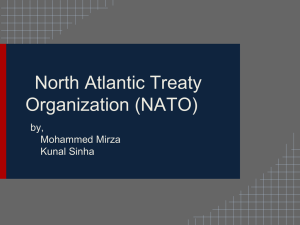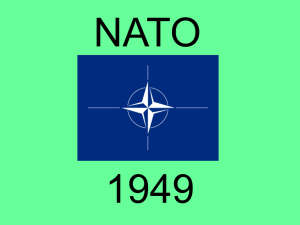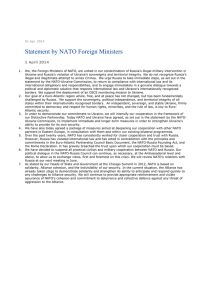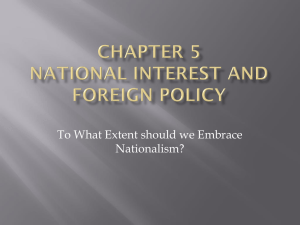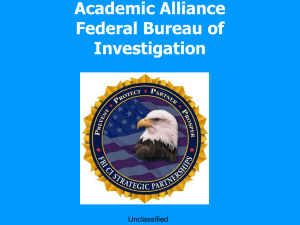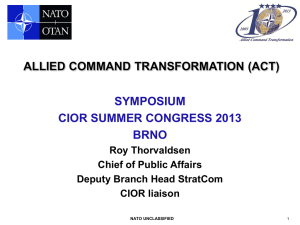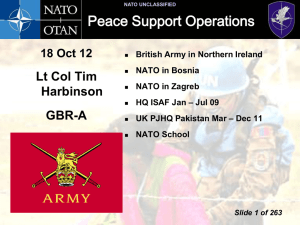NATO UNCLASSIFIED
advertisement
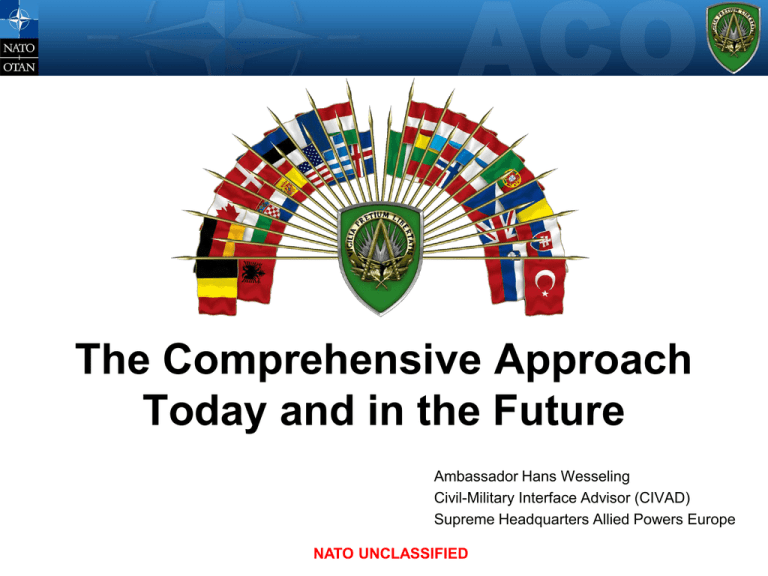
The Comprehensive Approach Today and in the Future Ambassador Hans Wesseling Civil-Military Interface Advisor (CIVAD) Supreme Headquarters Allied Powers Europe NATO UNCLASSIFIED USS Montana NATO UNCLASSIFIED 21st Century Security Challenges “We have too many walls in the world of security. We need more bridges.” NATO UNCLASSIFIED Strategic Surprise The ‘Arab Spring’ Russia/Georgia Conflict – 2008 NATO UNCLASSIFIED The Comprehensive Approach Causes of instability and conflict are also Human Development issues Conflicts can no longer be adequately dealt with by military force alone NATO UNCLASSIFIED The World Bank Report CAUSES Insecurity Non-Inclusion Corruption SOLUTIONS Security Justice Jobs NATO UNCLASSIFIED The Comprehensive Approach The Comprehensive Approach is above all a mindset with which we address a crisis or conflict. It serves us to understand the environment in which we operate NATO UNCLASSIFIED The Lisbon Summit Declaration “To improve NATO’s contribution to a Comprehensive Approach and its ability to contribute, when required, to stabilisation and reconstruction, we have agreed to form an appropriate but modest civilian capability to interface more effectively with other actors.” NATO UNCLASSIFIED Mandate for Change: Strategic Concept 2010 “A comprehensive political, civilian and military approach is necessary for effective crises management. The Alliance will engage actively with other international actors before, during and after crises to encourage collaborative analysis, planning and conduct of activities.” “NATO will actively employ an appropriate mix of those political and military tools to help manage developing crises that have the potential to affect Alliance security, before they escalate into conflicts; to stop ongoing conflicts where they affect Alliance security and to help consolidate stability in postconflict situations where that contributes to Euro-Atlantic security.” NATO UNCLASSIFIED Mandate for Change: SACEUR’s Intent Comprehensive Crisis and Operations Management Centre “The CCOMC is the cornerstone of our effort to “Operationalize Lisbon” in accordance with HOSG direction. I am convinced that the CCOMC is an organization that will strengthen my command ability to think plan and act strategically effectively and efficiently across the crisis and operations spectrum (Article 4 and Article 5) in support of the security and defence decisions of Nations.” CCOMC Concept Paper 10 Nov 11. NATO UNCLASSIFIED Outcome of Change: SHAPE CCOM Process NATO Crisis Management Process (NCMP) SHAPE Comprehensive Crisis and Operations Management (SHAPE CCOM) Indications & Warning Assessment Response Options Development Planning Scanning Comprehensive Understanding Fused Options Direction -Crisis Scanning of Strategic Spaces -Initial Situational Awareness - Initial Estimation - Prudent Thinking - Prudent Activities - Strategic ROs -Strategic Directives - Plans Transition Command and Control Review - Strategic C2 - Ops Assessment - Stakeholder Feedback - Critique - Shared learning/LI/LL - Op Assessment -Transition Management Crisis Identification Group (CIG) NEW CRISIS Execution INTRA OPS CRISIS Estimation and Options Group (EOG) Response Direction Group (RDG) Current Operations Group (COG) Crisis Review Group (CRG) NATO UNCLASSIFIED 07 Outcome of Change: the CCOMC Cloud & CRISIS & OPERATIONS PANEL (COP) SPECIAL STAFF (INTAF, LEGAD, STRATCOM) STRAT MGMT BOARD (SMB) NATO HQ (IS, IMS) DIRECTOR OF MANAGEMENT (KNOWLEDGE MGMT) Crisis Identification Group (CIG) NATO ORGANIZATIONS (ACT, AGENCIES, COEs) SUBORDINATE HEADQUARTERS (JFCs, MC, AC, LC) Response Direction Group (RDG) Current Operations Group (COG) NATIONS (NATO & TCNS) Resources Estimation and Options Group (EOG) DCOS OPS (J2, J3, J9) DCOS PLANS (J5, J7) DCOS RESOURCES (J1, J4, J8,JENG, JMED) Crisis Review Group (CRG) DCOS CIS (J6, CYBER, NCISG) ACADEMIA & MEDIA IGOs NGOs LIAISON OFFICERS NATO UNCLASSIFIED DCOS MPD (PARTNERS) 08 SHAPE’s Task The three essential aspects of a Comprehensive Approach are: 1. Improving the application of the Alliance’s own crisis management instruments. 2. Improving the Alliance’s practical cooperation at all levels with partners, the UN and other relevant International Organisations, Non-Governmental Organisations and local actors in the planning and conduct of operations. 3. Enhancing NATO’s ability to bring military support to stabilisation activities and reconstruction efforts in all phases of a conflict. NATO UNCLASSIFIED Comprehensive Approach to Crisis Management Partners NGO Current Ops NATO WMD Center Intel Fusion OSCE Terrorist Threat Intelligence Unit COE: Defense Against Terrorism Civ-Emer Planning NATO NATO National Reps COE: ENERGY Other COE IS/IMS EADRCC COE: CYBER IO UN Identification & Monitoring Response Options GO EU Coordinated Action NATO UNCLASSIFIED Stabilisation Monitoring The Berlin Plus Arrangements The Berlin Plus arrangements provide the basis for NATO-EU cooperation in crises by allowing the EU to have access to NATO assets including: 1. Access to NATO planning 2. A NATO European command option 3. Use of NATO capabilities NATO UNCLASSIFIED NATO-EU: A Strategic Partnership NATO and the EU can and should play complementary and mutually reinforcing roles in supporting international peace and security NATO will: • • • • Fully strengthen the strategic partnership with the EU Enhance cooperation Broaden political consultations Cooperate in capability development NATO UNCLASSIFIED Some points to consider How closely must we really interact? Is it enough to have: 1. some common goals? 2. a broad code of conduct? NATO UNCLASSIFIED Spectrum of Civil-Military Interaction Different forms of interaction INTEGRATE PARTNER/EMBED COLLABORATE COOPERATE COORDINATE DECONFLICT DIALOGUE/DISCUSS AVOID/IGNORE COMPETE NATO UNCLASSIFIED Future of the Comprehensive Approach NATO UNCLASSIFIED QUESTIONS? NATO UNCLASSIFIED
